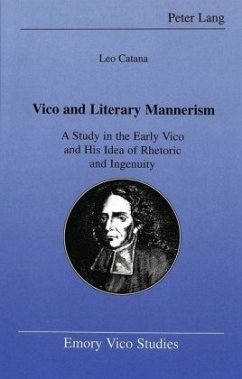The Italian philosopher Giambattista Vico (1668-1744) is known mainly for his philosophy of history. Although he taught rhetoric at the University of Naples most of his life, this occupation has hitherto been regarded as insignificant to his philosophy. However, a manual from 1711, used for teaching rhetoric, makes it clear that the tradition of rhetoric was very important to his philosophy, especially the literary rhetoric of the seventeenth century, formulated by Emanuele Tesauro (1592-1675) and Matteo Peregrini (1595-1652). The present book explains how Vico picked up ideas on metaphor and ingenuity from this literary rhetoric, how he turned them into valuable concepts in a general theory of knowledge, and how Vico's original position enabled him to criticize Descartes' idea of rationality. An appendix provides English translations of the relevant passages of Tesauro and Peregrini.
Bitte wählen Sie Ihr Anliegen aus.
Rechnungen
Retourenschein anfordern
Bestellstatus
Storno

